|
|
|
Sort Order |
|
|
|
Items / Page
|
|
|
|
|
|
|
| Srl | Item |
| 1 |
ID:
094453
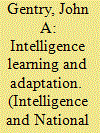

|
|
|
|
|
| Publication |
2010.
|
| Summary/Abstract |
Critics of US intelligence focus extensively on the alleged inability and unwillingness of intelligence agencies to learn and adapt. Analysis of eight counterinsurgency wars suggests instead that external factors largely influence the intelligence-related performance of whole governments, including organizational structures, unity of effort and command, adequacy of resources, and leadership quality. Assessment of the performance of US intelligence since 9/11 indicates that the same variables influence the performance of US intelligence, suggesting that the US intelligence reform debate focuses too narrowly and on the wrong factors.
|
|
|
|
|
|
|
|
|
|
|
|
|
|
|
|
| 2 |
ID:
166780
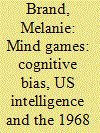

|
|
|
|
|
| Summary/Abstract |
This article examines the impact of cognitive bias on the analytic output of the United States intelligence community during the Prague Spring. Utilising a range of primary sources, including declassified documents, oral history and contemporary accounts, this article argues that as a result of heuristic biases, analysts formed the mindset that the Soviet Union would not invade Czechoslovakia, and did not alter that assumption in the face of increasing evidence to the contrary. Consequently analysts possessed a distorted understanding of both Soviet intentions and the prevailing political environment and did not accurately convey the likelihood of military action to consumers.
|
|
|
|
|
|
|
|
|
|
|
|
|
|
|
|
| 3 |
ID:
093928
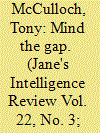

|
|
|
| 4 |
ID:
191105
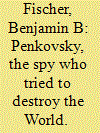

|
|
|
|
|
| Summary/Abstract |
Central Intelligence Agency (CIA) lore and popular culture tout Col. Oleg Penkovsky as “the spy who saved the world” during the Berlin and Cuban missile crises. In fact, his contribution to U.S. intelligence and policymaking is exaggerated, distorted, and in several instances falsified. More disturbing, Penkovsky harbored a murderous rage against the Soviet system and repeatedly tried to inveigle the West in a quixotic quest to destroy it. He devised a plan to blow up Moscow, advocated preventive war against the Soviet Union, fanned the flames of the Berlin crisis with false reports of Kremlin mobilization for war, and recommended assassinating Soviet leader Nikita Khrushchev. Penkovsky allegedly provided critical information that bought time for President John F. Kennedy to devise a diplomatic solution to the Cuban crisis before Soviet missiles were ready to fire. Not true, according to the president’s advisers. New information reveals that some Soviet missiles were combat-ready two days before U.S. intelligence discovered the first incomplete launch site. The State Committee for Security (KGB) allowed Penkovsky to continue spying for at least ten months after he came under suspicion, perhaps to protect a mole in American or British intelligence. A senior CIA officer claimed that, meanwhile, the Soviets controlled and manipulated Penkovsky without his knowledge. Even after his arrest, Penkovsky may have attempted to instigate a nuclear war by tricking the KGB into sending a false alert of an impending Soviet surprise attack on the United States.
|
|
|
|
|
|
|
|
|
|
|
|
|
|
|
|
| 5 |
ID:
138732
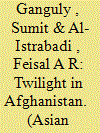

|
|
|
|
|
| Summary/Abstract |
AFTER CONSIDERABLE EXPENDITURE OF BOTH BLOOD AND TREASURE, the United States has now effectively withdrawn from Afghanistan. As of January 2015, over 2,200 U.S. servicemen and women have died in combat in that country, with more than 17,200 Afghan civilians dead. Further, according to a Pentagon estimate, the war has cost the U.S. $300 million a day. Support for the war in the U.S. has begun to wane in Congress, and the Obama administration does not seem overly concerned about declining congressional support. U.S. allies, who have steadily reduced their presence in the country, also show signs of growing fatigue with their involvement as domestic support for the presence of their troops in Afghanistan has dramatically tapered off.
|
|
|
|
|
|
|
|
|
|
|
|
|
|
|
|
| 6 |
ID:
134897
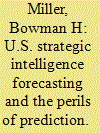

|
|
|
|
|
| Summary/Abstract |
Prediction, even of tomorrow's weather, remains a decidedly inexact science, but forecasting strategic geo-political or economic change is vastly more challenging. The Old Farmers’ Almanac has been in continuous publication in the United States since 1792, predicting long-term weather patterns and phases of the moon, among other things. But in 1942 the U.S. government sought to ban its publication after a German spy with a copy of the Almanac was apprehended. Suspicions centered on what the German might have found of intelligence value in this household volume, with special concern focused on “weather forecasts.” Confronted with a potential wartime ban on its publication, the Almanac relabeled that section “weather indications,” and the threatened ban was vacated. 2 The Almanac's “prediction” had nothing to do with warfare and everything to do with when to plant crops and gardens.
|
|
|
|
|
|
|
|
|
|
|
|
|
|
|
|
| 7 |
ID:
164196
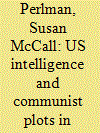

|
|
|
|
|
| Summary/Abstract |
In 1946, as the cold war deepened and American officials grew alarmed by the prospect of a communist-dominated France, US intelligence analysts began to report rumors of mysterious ‘parachutages’ of unidentified containers over the French countryside. Alongside equally sensational stories about the resurrection of international brigades and discoveries of hidden arms caches, these reports seemed to provide definitive evidence for widely held beliefs about communist intentions to seize power. This article investigates these claims and reveals the influence of a transnational network of informants hoping to stoke fears of revolutionary activity in order to encourage US involvement in postwar France.
|
|
|
|
|
|
|
|
|
|
|
|
|
|
|
|
| 8 |
ID:
118253
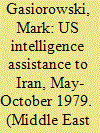

|
|
|
|
|
|
|
|